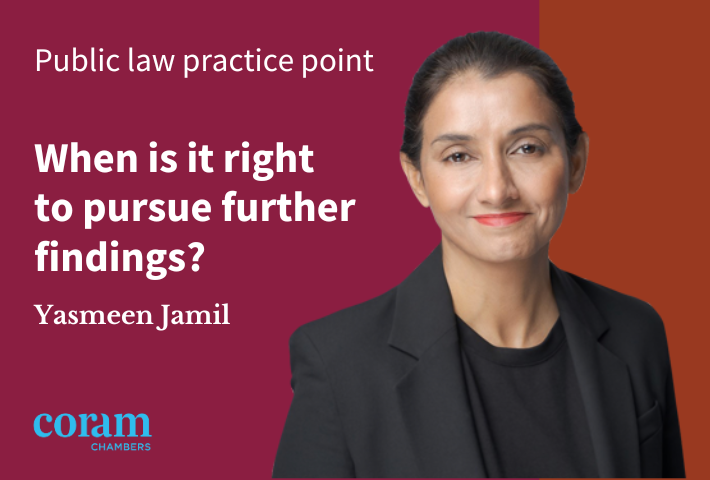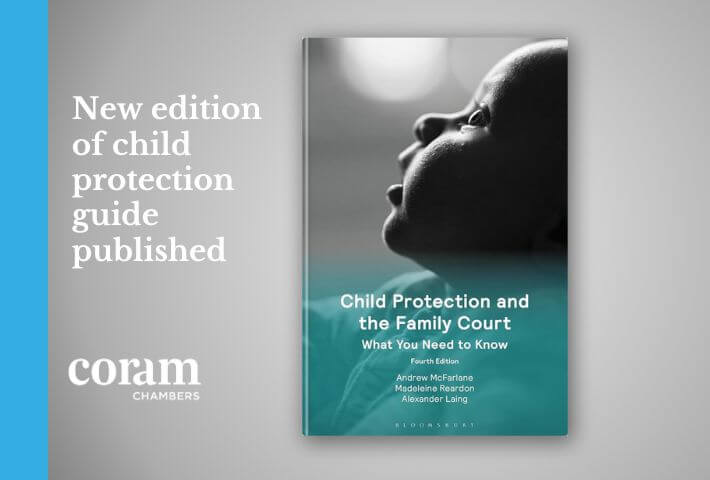
Yasmeen Jamil explores: When is it right to pursue further findings?
In several cases this year, I have been instructed to draft and pursue disputed threshold findings or a separate findings of fact schedule.
Often, the case in respect of threshold is clear, however not always.
Parents, for understandable reasons, may be willing to accept a degree of conflict, the children’s exposure to shouting, arguments and police involvement, but not the facts of particular incidents.
There is also an understandable temptation for parties to agree threshold and move forward to the welfare stage of the case, particularly in cases where the final care plan is agreed. This can leave a local authority vulnerable in any subsequent care proceedings.
The question arises, when is it right for a party to pursue disputed facts?
Any party seeking further findings, or undecided about whether further findings should be pursued, ought to go back to the principles articulated by McFarlane J (as he was then) in OXFORDSHIRE CC V DP & 0THERS 2005 2 FLR 1031, [2005] EWHC 1593 (Fam):
“[24] The authorities make it plain that, amongst other factors, the following are likely to be relevant and need to be borne in mind before deciding whether or not to conduct a particular fact finding exercise:
(a) the interests of the child (which are relevant but not paramount)
(b) the time that the investigation will take;
(c) the likely cost to public funds;
(d) the evidential result;
(e) the necessity or otherwise of the investigation;
(f) the relevance of the potential result of the investigation to the future care plans for the child;
(g) the impact of any fact-finding process upon the other parties;
(h) the prospects of a fair trial on the issue;
(i) the justice of the case.”
The Court of Appeal endorsed this approach in Re H-D-H and C [2022] 1 FLR 454. In Re H-W [2023] 2 FLR 171 the Court of Appeal again endorsed the approach outlined in Oxfordshire CC v DP & others and referred to the additional principle of the overriding objective, FPR 2010, Part 1 R1.1:
“1.1
(1) These rules are a new procedural code with the overriding objective of enabling the court to deal with cases justly, having regard to any welfare issues involved.
(2) Dealing with a case justly includes, so far as is practicable –
(a) ensuring that it is dealt with expeditiously and fairly;
(b) dealing with the case in ways which are proportionate to the nature, importance and complexity of the issues;
(c) ensuring that the parties are on an equal footing;
(d) saving expense; and
(e) allotting to it an appropriate share of the court’s resources, while taking into account the need to allot resources to other cases.
1.2
(1) The court must seek to give effect to the overriding objective when it –
(a) exercises any power given to it by these rules; or
(b) interprets any rule.”
It is important to note that when the court is faced with the task of deciding whether an inquiry into disputed findings will be permitted, a detailed investigation into the quality of the evidence, at that stage, is not permissible, Re H-W [2023].
In another case I became involved in (unreported), the local authority withdrew allegations of sexual abuse on the basis that the ABE process of the child was flawed, the foster carer’s exchanges with the child potentially undermined the allegations, the police closed its investigation and the parents accepted neglect allegations, which took the case over threshold.
The child continued to make allegations of sexual abuse. The local authority properly sought further legal advice, changed its stance and sought to pursue the abandoned case concerning sexual abuse.
After multiple days arguing the Oxfordshire CC v DP points in court, with leading counsel representing each party by this stage, the court agreed with the local authority and listed the case for a lengthy fact-finding hearing.
The point here is that care cases are dynamic. Even if threshold is agreed at an earlier stage in the case, if and when new facts come to light, the complexion of the case can change and the question of seeking further findings may arise.
My advice is to gather all the available evidence, obtain any third-party statements, and go back to the principles in Oxfordshire CC v DP.
Yasmeen is an experienced public and private law family practitioner who is routinely instructed to represent local authorities, parents, and children’s guardians in care proceedings and, in complex cases involving disputed medical evidence, serious injury and sexual abuse allegations.
You can view Yasmeen’s profile here.


